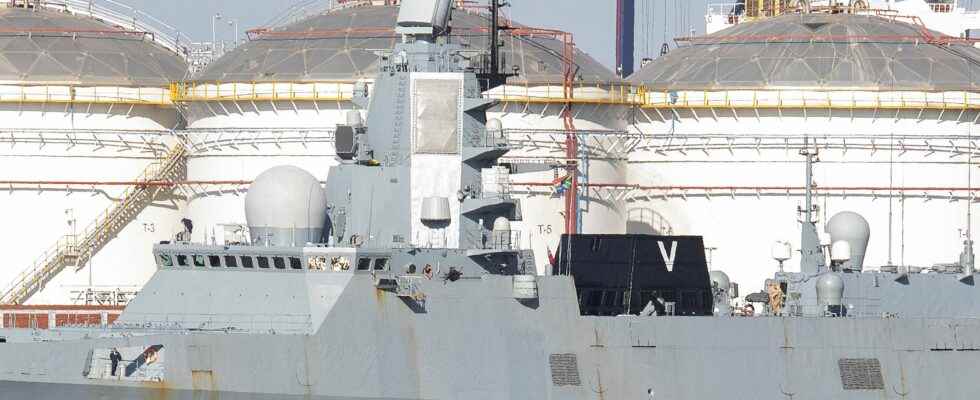South Africa launched on Friday February 17 the first preparatory stages of a joint naval exercise with Russia and China “with the aim of sharing operational skills and knowledge”. An initiative that she describes as routine but which has aroused strong internal criticism and fears about the endangerment of relations with certain Western partners.
Planned for a long time, the naval exercise “Mosi II”, which means “smoke” in the Sotho language, involves more than 350 South African soldiers and must continue until February 27 off Durban (southeast), southern Africa’s largest port on the Indian Ocean, and Richards Bay, some 180 kilometers further north. For Pretoria, this is just a classic exercise with its BRICS allies (Brazil, Russia, India, China and South Africa). “The Russian frigate has arrived in Durban. The Chinese boat will arrive later. We are in the preparation phase, the main maneuver will take place on February 22,” a military source told AFP.
South Africa’s ruling African National Congress has long-standing ties to Moscow, which backed its fight against a racist apartheid regime. The country indeed abstained from voting on a United Nations resolution condemning Russia last year and claims to maintain a neutral position on the Ukrainian conflict. But the organization of these military maneuvers with China and Russia falls particularly badly, the date coinciding with the first anniversary of the invasion of Ukraine by Moscow on February 24.
“Role of the Useful Idiot”
Russia’s actions have themselves fueled controversy: the Kremlin deployed the Admiral Gorshkov frigate, armed with a next-generation hypersonic cruise missile, the Zircon. Russian President Vladimir Putin called the weapon, which can travel at more than five times the speed of sound, “unstoppable”. Russian news agency TASS reported this month that the frigate will conduct a practice firing during the exercise. Information denied by the South African army.
For the main opposition party, the Democratic Alliance, and one of its representatives, Kobus Marais, the government should have canceled these exercises: “It is senseless and irresponsible. South Africa is playing the role of the useful idiot in this obvious Russian propaganda exercise against Western forces.”
Last weekend, the ship carrying the Zircon docked in Cape Town, sporting the letters Z and V on its sides, symbols used by the Kremlin to promote war in Ukraine, drawing the ire of the city’s mayor. “Cape Town will not be complicit in Russia’s evil war. South Africa’s presidency must answer for its complicity,” Geordin Hill-Lewis tweeted, declaring the ship unwanted in the city.
Establish a new world order
On a visit to Pretoria last month, the head of European diplomacy, Josep Borrell, spoke of “irritating things” about relations between South Africa and Russia. White House spokeswoman Karine Jean-Pierre, when asked about these joint military maneuvers, expressed “the concern of the United States”.
Despite the criticism, Pretoria is sticking to its guns. “South Africa, like any independent and sovereign state, has the right to conduct its foreign relations according to its national interests,” the South African Ministry of Defense said last month, recalling similar exercises carried out with other international partners, including one with France in November.
World powers are vying for influence in Africa amid rising global tensions stemming from the war in Ukraine and China’s increasingly aggressive stance on Taiwan. Some African countries, like South Africa, categorically refuse to take sides and seek to take advantage of this diplomatic standoff, eager to find alternatives to Western hegemony.
“The country wants to maintain its economic relations with the North, but would also like to establish a new world order. And Russia and China are good partners for this, who share this ideology”, analyzes on RFI Jo-Ansie van Wyk, professor of international politics at the University of South Africa.
A risk for the country’s economy
This strategy seems particularly risky to many observers. “These exercises are going to be a lightning rod, believes Steven Gruzd, of the South African Institute of International Affairs, from Reuters. I’m not sure South Africa really realizes the potential backlash.”
Pretoria’s foreign policy could indeed harm its economic interests. “Some companies have asked us if it is still safe to engage with South Africa for business, as they fear possible consequences,” an EU ambassador told Reuters. Several diplomats from NATO or EU countries and based in South Africa have already condemned the exercise.
While China is now Africa’s largest bilateral trading partner, the EU remains by far the largest market for South African exports. According to South African data, two-way trade with the EU amounted to around $53 billion last year, compared to just over $750 million with Russia.
